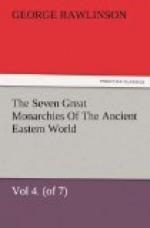The Babylonians, notwithstanding their pride, their cruelty, their covetousness, and their love of luxury, must be pronounced to have been, according to their lights, a religious people. The temple in Babylonia is not a mere adjunct of the palace, but has almost the same pre-eminence over other buildings which it claims in Egypt. The vast mass of the Birs-i-Nimrud is sufficient to show that an enormous amount of labor was expended in the erection of sacred edifices; and the costly ornamentation lavished on such buildings is, as we shall hereafter find, even more remarkable than their size. Vast sums wore also expended on images of the gods, necessary adjuncts of the religion; and the whole paraphernalia of worship exhibited a rare splendor and magnificence. The monarchs were devout worshippers of the various deities, and gave much of their attention to the building and repair of temples, the erection of images, and the like. They bestowed on their children names indicative of religious feeling, and implying real faith in the power of the gods to protect their votaries. The people generally affected similar names—names containing, in almost every case, a god’s name as one of their elements. The seals or signets which formed almost a necessary part of each man’s costume were, except in rare instances, of a religious character. Even in banquets, where we might have expected that thoughts of religion would be laid aside, it seems to have been the practice during the drinking to rehearse the praises of the deities.
We are told by Nicolas of Damascus that the Babylonians cultivated two virtues especially, honesty and calmness. Honesty is the natural, almost the necessary virtue of traders, who soon find that it is the best policy to be fair and just in their dealings. We may well believe that this intelligent people had the wisdom to see their true interests, and to understand that trade can never prosper unless conducted with integrity and straightforwardness. The very fact that their trade did prosper, that their goods were everywhere in request, is sufficient proof of their commercial honesty, and of their superiority to those tricks which speedily ruin a commerce.
Calmness is not a common Oriental virtue. It is not even in general very highly appreciated, being apt to strike the lively, sensitive, and passionate Eastern as mere dulness and apathy. In China, however, it is a point of honor that the outward demeanor should be calm and placid under any amount of provocation; and indignation, fierceness, even haste, are regarded as signs of incomplete civilization, which the disciples of Confucius love to note in their would-be rivals of the West.




